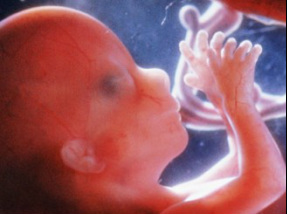
Note: This article is in response to a piece written by J.Says, entitled "Women's Rights: More Than Just Abortion."
According to many early feminists, abortion reflects not female empowerment, but a society in which being male is still the ideal. Rather than appreciating things that are uniquely female and powerful, like the ability to bear a child, society asserts that women must become like men in form and function to receive respect. Men still find social advancement easier than women who want to be mothers. This reality was reflected in President Obama's statement that Roe v. Wade allowed "our daughters [to] have the same rights, freedoms, and opportunities as our sons to fulfill their dreams." Abortion has done no more to resolve the problems of sexism than heavy makeup does to resolve racism. Financial success is still revered more than motherhood, as though moving up in the corporate world were more important than shaping the next generation.
"When we consider that women are treated as property, it is degrading for women to treat their children as property, to be disposed of as they see fit."-feminist Elizabeth Cady Stanton (1873)
The concept of children as property is an ancient idea we never fully abandoned. Child abuse first gained national attention in the late 1800's. The ownership of one's children was considered so personal and private, there wasn't even an institution for the prevention of child abuse. In fact, the first prosecuted child abuse case in the U.S. was brought by the Society for the Prevention of Cruelty to Animals. In many ways, we continue this tradition today. Many liberal Democrats would consider it cruel to shoot a cat or dog that inconveniences them, but would accept a woman's right to abort for the same reason.
Two of the major questions in the abortion argument are "when does life begin to matter?" and "how far do abortion rights extend?" Catholics and other religious groups might contend that value begins at conception. Some atheists and pro-choice advocates believe it matters when the entity develops a self-concept. Both ideas are difficult to prove. Because of this, scientists choose different measures. Recently, many states have outlawed abortions occurring after 22 weeks because of ample scientific evidence that a fetus of that age can feel and react to pain. Even the federal government was willing to recognize some limits on abortion by upholding a partial-birth abortion ban. Most people, regardless of political affiliation, would concede that abortions past the point of viability are unethical. A layer of tissue is the only difference between an infant born a month early and an 8 month old fetus. To allow the abortion of an 8 month fetus would make opposition to infanticide seem hypocritical. The question of viability has been used by some to extend the abortion argument to young infants. There was a recent article in the Journal of Medical Ethics entitled "After-birth abortion: why should the baby live?" The authors received death-threats for their publication, but it raises some valid points. It argues that parents should have the option to "abort" their infant if they discover disabilities that medical exams didn't show. Many of the arguments for or against adoption in such a case would still hold true.




 RSS Feed
RSS Feed